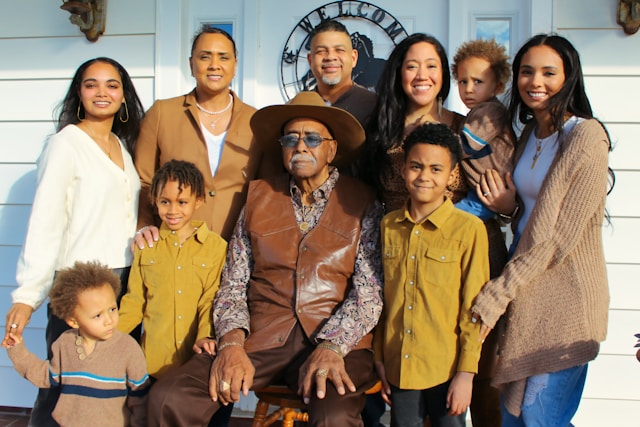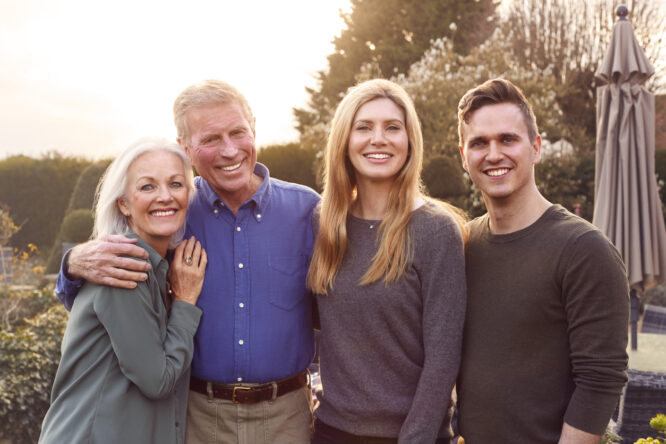It’s easy to romanticise your parents’ relationship, especially if they seemed solid growing up.

You might think that they were the happiest couple ever, and that the kind of love they shared is the perfect ideal to strive for. The problem is that chasing a love that mirrors theirs can quietly shape your expectations in ways that don’t always serve you. Here’s why putting Mum and Dad’s love on a pedestal probably won’t serve you well in the long run.
1. You’re comparing your start to their finish.

Most people only saw their parents’ relationship after years of growth, compromise, and shared history. It’s easy to forget that they went through awkward first dates, disagreements, and learning curves long before they got to that comfortable rhythm you remember.
Trying to recreate the end result without seeing the full journey puts unrealistic pressure on your own relationship. It skips over the reality that closeness is built, not inherited, and that every couple’s story unfolds differently as time goes on.
2. You’re idealising what you never fully witnessed.

Even in stable homes, you didn’t see every argument, tension, or moment of distance. Parents tend to shield children from conflict, which can make their relationship look smoother than it actually was. What you think was “perfect” might’ve just been private.
That creates a filtered version of love in your mind—one that doesn’t make space for messiness or growing pains. As a result, when your own relationship feels more complicated, you might unfairly assume something’s wrong rather than just human.
3. You might downplay what didn’t actually work for them.

Some people see their parents as a gold standard even if parts of that relationship weren’t emotionally healthy. Whether it was communication gaps, imbalance, or quiet resentments, those things may have been normalised simply because they were consistent.
If you’re using their model without questioning what actually felt good or fair, you risk repeating patterns that didn’t serve them, and might not serve you either. Admiring their longevity is fine, but it’s worth being honest about the full picture too.
4. You might ignore how much times have changed.

Your parents built their relationship in a completely different world. Social expectations, gender roles, career pressures, and even how people meet have shifted dramatically. What worked for them may not even be logistically possible now.
When you try to copy a relationship dynamic rooted in another era, you might end up feeling like something’s missing without understanding why. Relationships today often require a different kind of balance and flexibility that their setup didn’t demand.
5. You’re less likely to question your own wants.

When you’re set on recreating someone else’s blueprint, it’s easy to override your personal preferences without realising it. You might want different boundaries, communication styles, or lifestyle choices than what you saw at home, but never give yourself permission to explore them.
It can create a silent pressure to measure happiness against someone else’s version of “success.” That can lead to settling into patterns that don’t reflect your actual needs, just the ones you were taught to admire.
6. You might rush intimacy too fast.

If your parents had a quick love story or married young, you might think things should fall into place just as effortlessly. That expectation can make you rush connection or overlook early red flags because you’re focused on getting to the end goal.
This pressure can lead to choosing someone based on what fits the image of “the one” rather than how the relationship actually feels. You’re chasing a milestone rather than letting a real connection unfold in its own timing.
7. You might tolerate things they quietly endured.

Not all long relationships are happy ones. Sometimes, parents stayed together out of duty, fear, or comfort, especially in generations where divorce carried more stigma. But when that quiet endurance is seen as strength, it’s easy to romanticise what was really just survival.
If you’re determined to follow their path, you might put up with behaviour that feels off because they did too. Of course, longevity isn’t the same as fulfilment. Love should feel safe and mutual, not just stable on the outside.
8. You’re setting the bar around someone else’s story.

Your relationship needs and values might look nothing like your parents’, and that’s okay. But when their dynamic becomes the gold standard, it can limit what you allow yourself to hope for. You might dismiss relationships that look different but feel right.
This mindset can quietly shrink your dating perspective. Instead of building something that works for who you are now, you end up chasing a copy of something that might not even reflect who you’ve become.
9. You may see conflict as a sign of failure.

If your parents rarely argued in front of you, you might think fighting means your relationship is doomed. That belief can make you avoid tough conversations or panic when disagreements arise, even if they’re totally normal and necessary.
This creates unrealistic expectations about harmony. All healthy couples navigate conflict—it’s how they grow. However, if your model didn’t include that, you might not have the tools to manage it without spiralling into self-doubt or fear.
10. You might look for someone who mirrors one of your parents.

It’s common to unconsciously pursue partners who feel familiar, especially if you deeply admired a parent. But sometimes, what feels “right” is just what you’re used to, not what’s actually healthy or compatible long-term.
That pattern can limit your growth in relationships. You might overlook better fits simply because they don’t match the energy or temperament of your family. Familiarity can feel comforting, but it’s not always a sign that you’re with the right person.
11. You risk ignoring your own emotional blueprint.
 Source: Pexels
Source: Pexels Everyone brings different emotional needs into relationships based on personality, trauma, and life experience. If you’re trying to model love after your parents without considering your emotional landscape, you may miss what truly supports you. It’s not selfish to ask what *you* need. Love isn’t one-size-fits-all, and copying someone else’s structure without making room for your feelings can leave you feeling disconnected from your own relationship.
12. You might expect to always feel sure, and panic when you don’t.

Parents in long-term marriages often talk about “just knowing” when they met, or feeling completely certain early on. If you don’t experience that same clarity, you might assume you’re with the wrong person or doing it wrong altogether.
Of course, certainty doesn’t always show up in lightning bolts. Sometimes it grows slowly, through trust and shared experience. Comparing your natural doubts or hesitations to their long-settled confidence can make you question something that’s actually unfolding just fine.
13. You might feel pressure to keep things private, even when you’re struggling.

In many families, especially older generations, relationship issues were kept quiet. That might’ve been about pride, privacy, or simply not knowing how to ask for help. But carrying that same silence can leave you feeling alone when you need support.
If you think strong relationships are the ones that never show cracks, you’re less likely to reach out during tough moments. And that isolation can make problems feel heavier than they are, especially if you believe your relationship should “just work” like theirs seemed to.
14. You could miss out on building something better suited to you.

Chasing a relationship like your parents’ might seem sweet on the surface, but it can block you from creating a connection that reflects your actual values, desires, and lifestyle. You deserve a love that fits you, not just your family story.
Sometimes, the most meaningful relationships look nothing like the ones we admired growing up. They’re quieter, or freer, or softer in ways we never imagined. And letting go of the old blueprint can open the door to something far more real.
15. You’re putting pressure on your partner to play a role.

Even if you don’t realise it, modelling your relationship after your parents’ dynamic can place unfair expectations on your partner. You might assume they should act, think, or show love in the same ways you saw growing up, even if it’s not their natural style.
That kind of unspoken comparison can lead to resentment or confusion, especially if your partner feels like they’re constantly falling short. Real connection is built when you both get to be yourselves, not when one person is unknowingly cast in a role they never agreed to play.




